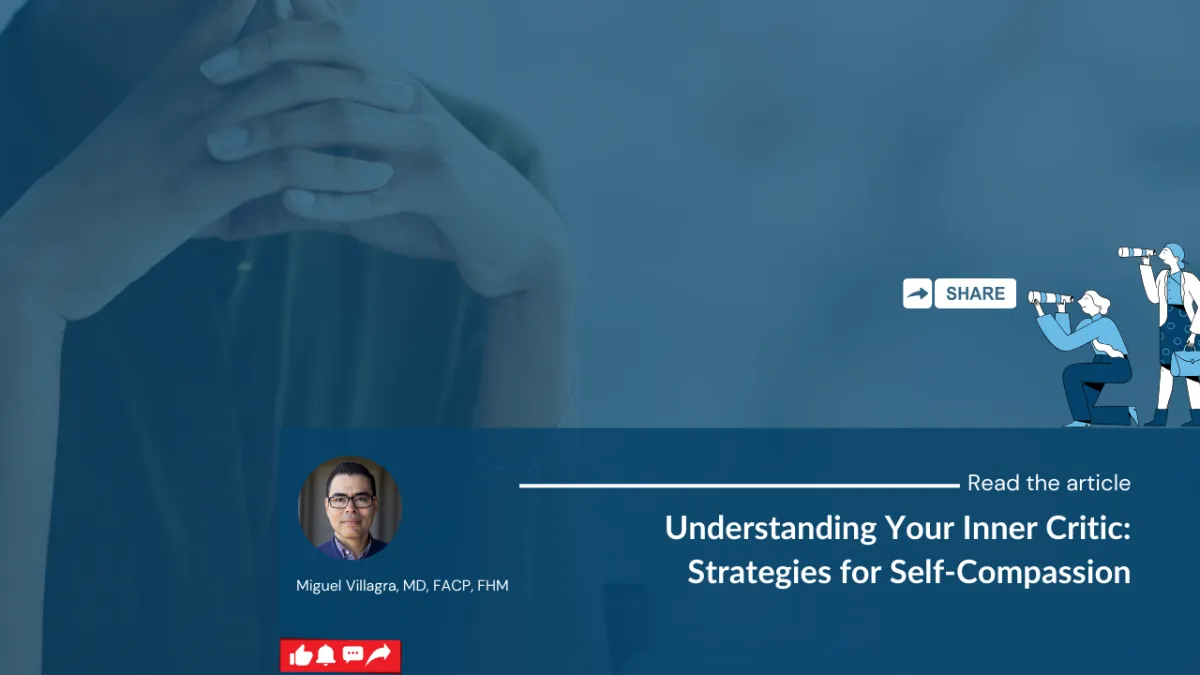
Understanding Your Inner Critic: Strategies for Self-Compassion
Every healthcare professional has an inner critic—that voice that questions abilities, amplifies doubts, and undermines confidence. While self-evaluation is an essential part of growth, excessive self-criticism can take a toll on mental fitness and well-being. Understanding and managing the inner critic is key to cultivating resilience and self-compassion. This post explores how to identify and regulate your inner critic using strategies inspired by the Positive Intelligence framework.

Identifying the Inner Critic

Your inner critic often manifests as negative self-talk, leading to feelings of inadequacy and self-doubt. This voice might tell you that you are not competent enough, that you don’t belong, or that mistakes define your worth.
In the Positive Intelligence framework, the inner critic is represented by the "Saboteurs"—negative thought patterns that diminish your ability to respond effectively to challenges. The "Judge" is the primary Saboteur, constantly finding flaws in yourself, others, and circumstances. Recognizing the Judge and other associated Saboteurs, such as the Pleaser, Hyper-Achiever, or Avoider, is the first step toward breaking their grip.
Strategies to Overcome Your Inner Critic

Awareness: Recognize when negative thoughts arise. Pay attention to patterns in your self-talk and acknowledge when the Judge or other Saboteurs are at play. Awareness diminishes their power and creates space for a more balanced perspective.
Challenge Negative Thoughts: Question the validity of your inner critic’s claims. Ask yourself: Is this thought based on facts or assumptions? Would I speak to a friend this way? Reframing internal dialogue with objective reasoning can reduce self-judgment.
Practice Self-Compassion: Treat yourself with the same kindness you would offer a friend. When faced with setbacks, replace harsh self-criticism with supportive affirmations. Dr. Kristin Neff, a leading expert on self-compassion, suggests using phrases like "I am doing my best, and that is enough."
Reframe Your Thoughts: Shift your perspective to focus on growth rather than failure. Instead of viewing mistakes as proof of incompetence, see them as opportunities for learning. Reframing setbacks in a constructive light fosters resilience and continuous improvement.
Engage in Mental Fitness Exercises: Positive Intelligence suggests practicing "PQ reps," or small mental exercises that strengthen positive neural pathways. Techniques like deep breathing, mindfulness, and shifting attention to the present moment can help disrupt negative thought patterns and reinforce a more optimistic mindset.
Conclusion

Managing your inner critic is essential for maintaining mental fitness and self-esteem. By recognizing its voice, challenging its claims, practicing self-compassion, and reframing thoughts, healthcare professionals can cultivate resilience and confidence. Remember, self-kindness is not a sign of weakness—it is a strength that fuels long-term success and well-being.
What techniques do you use to combat negative self-talk? Share your insights below and let’s support each other in fostering self-compassion and resilience!

Know more about our Mental Fitness Program: https://www.adoctorsjourney.com/mental-fitness-positive-intelligence-program
SUBSCRIBE TO OUR NEWSLETTER 👇
